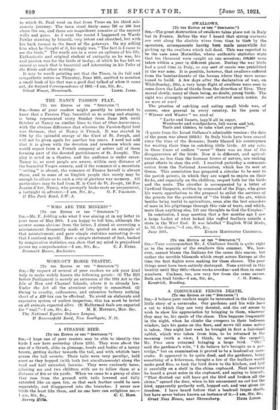SWALLOWS.
[To Tee Ferree or Tax " Sexceeron.”1
Sale—The great destruction of swallows takes place not:in Italy but in France. Before the war I heard that strong currents are sent along the electric wires from time to Jinn by the operators, arrangements having been made meanwhile for picking up the swallows which fall dead. This was reported to be the case near Marseilles, where authentic statistics state that ten thousand were caught on one occasion.; 800,1300 were taken within a year in different places. During. the war birds had a good time in Italy, as any -sort of caecia was prohibited in the war zone. It is possible, however, that swallows suffered from the bombardments -of the houses where they were accus- tomed to build. A few days after the declaration of war, on Whit-Sunday, 1915, a very large flight of-swallows were-seen to come down the-Lake of Garda from the direction of Rive. They moved slowly, many of them being, no.cloubteyoung birds. The sight was strangely impressive and attracted• much notice. So we were at war!
The practice of catching and eating small birds was, of course, once general in every country. In the poem of " Winner and Waster" we read of
"Larks and linnets, lapp'd all in sugar, Woodcocks and woodpeckers, full- warm and hot, Teals and titmice, to take what you. please."
(I quote from Sir Israel Gollancz's admirable vereione the-date of the poem was about 1352-3.) In Italy birds have been snared since the time of the Romans; Dante blamed his countrymen for wasting their time in catching little birds. At any rate, in those times of endless "cover" there was no fear of the disappearance of the birds. Now it is different, and agricul- turists, no less than the humane lovers of nature, are making great efforts to stem the evil. I received, yesterday a communi- cation from the National Association, which has its seat at Genoa. This association has prepared a circular to be sent to the parish priests, in which they are urged to- enjoin on their flocks, and• especially on the children, respect bath for the birds and the nests. The circular is accompanied by a letter of Cardinal Gasparri, written by command of the Pope, who-gives his warm approbation to the proposal to enlist the services- of the priests for the protection of "the birds of the air, which: besides being useful to agriculture, seem also the best consolers of man in his pilgrimage through this vale of tears, and which, more than anything else, lift our thoughts to God the Creator."
In conclusion, I may mention that a few months ago I saw a large basket of what looked like ruffled feathers outside a store in the West End. It was labelled " English Wild Birds, ls. 9d. the dozen."—I am, Sir, &c.,
June 20th. EVELYN MARTI:CENG° CESARESCO.


































 Previous page
Previous page